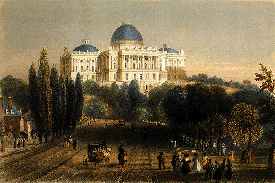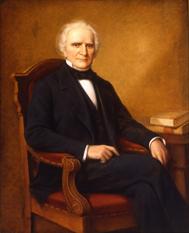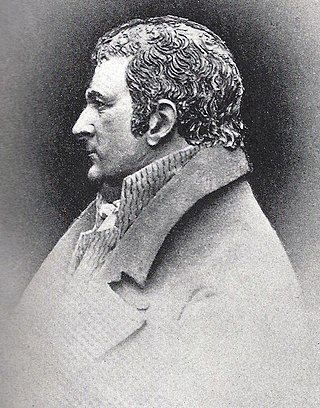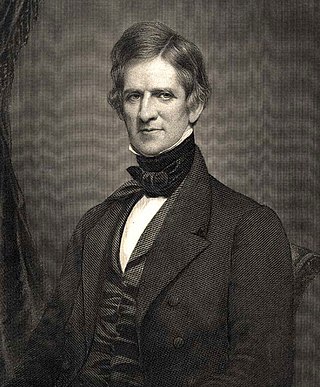
The 17th United States Congress was a meeting of the legislative branch of the United States federal government, consisting of the United States Senate and the United States House of Representatives. While its term was officially March 4, 1821, to March 4, 1823, during the fifth and sixth years of James Monroe's presidency, its first session began on December 3, 1821, ending on May 8, 1822, and its second session began on December 2, 1822, to March 3, 1823. The apportionment of seats in the House of Representatives was based on the 1810 United States census. Both chambers had a Democratic-Republican majority.

Samuel Delucenna Ingham was a state legislator, judge, U.S. Representative and served as U.S. Treasury Secretary under President Andrew Jackson.
Ebenezer Elmer was an American physician from Bridgeton, New Jersey. He represented New Jersey in the U.S. Congress from the Democratic-Republican Party from 1801 to 1807. Elmer's older brother, Jonathan Elmer, and Ebenezer's son Lucius Elmer were members of the United States House of Representatives.

The 1822–23 United States House of Representatives elections were held on various dates in various states between July 1, 1822, and August 14, 1823. Each state set its own date for its elections to the House of Representatives before the first session of the 18th United States Congress convened on December 1, 1823. They occurred during President James Monroe's second term.
The 1820–21 United States House of Representatives elections were held on various dates in various states between July 3, 1820, and August 10, 1821. Each state set its own date for its elections to the House of Representatives before the first session of the 17th United States Congress convened on December 3, 1821. They coincided with President James Monroe winning reelection unopposed.
The 1814–15 United States House of Representatives elections were held on various dates in various states between April 26, 1814, and August 10, 1815. Each state set its own date for its elections to the House of Representatives before the first session of the 14th United States Congress convened on December 4, 1815. They occurred during President James Madison's second term. Elections were held for all 182 seats, representing 18 states.

The 1812–13 United States House of Representatives elections were held on various dates in various states between August 3, 1812, and April 30, 1813. Each state set its own date for its elections to the House of Representatives before the first session of the 13th United States Congress convened on May 24, 1813. They coincided with James Madison being re-elected president.

The 1806–07 United States House of Representatives elections were held on various dates in various states between April 29, 1806 and August 4, 1807. Each state set its own date for its elections to the House of Representatives before the first session of the 10th United States Congress convened on October 26, 1807. They occurred during Thomas Jefferson's second term. Elections were held for all 142 seats, representing 17 states.

The 1798–99 United States House of Representatives elections were held on various dates in various states between April 24, 1798 in New York and August 1, 1799 in Tennessee. Each state set its own date for its elections to the House of Representatives, with some after the official start of the 6th United States Congress on March 4, 1799, but before the start of the first session of this Congress in Philadelphia on December 2, 1799. These elections were held during President John Adams term. It was the last congressional session before the move to the new capital at Washington, D.C. Elections were held for all 106 seats, representing 16 states.

Oliver Hampton Smith was a United States representative and Senator from Indiana.
James Morgan was a Continental Army officer during the American Revolutionary War and a United States Congressman from New Jersey.
James Lockwood Conger was an American lawyer and politician from the U.S. state of Michigan. From 1851 to 1853, he served one term in the U.S. House of Representatives as a member of the Whig party.

William Milnor was a member of the United States House of Representatives from Pennsylvania and Mayor of Philadelphia.

Samuel Moore was a member of the U.S. House of Representatives from Pennsylvania.

Thomas Newbold was a U.S. Democratic-Republican politician.

Isaiah Dunn Clawson was an American Opposition Party / Republican Party politician who represented New Jersey's 1st congressional district in the United States House of Representatives from 1855 to 1859.
Joseph Kille was an American politician who served a single term in the United States House of Representatives, representing the at-large congressional district of New Jersey from 1839 to 1841 as a Democrat in the 26th United States Congress. Kille also served in the New Jersey General Assembly before and after his tenure in Congress.

Philemon Dickerson was a United States representative from New Jersey, the 12th governor of New Jersey and judge of the United States District Court for the District of New Jersey.
James Sproat Green was an American lawyer who served as U.S. Attorney for the District of New Jersey from 1835 to 1850. He was the father of New Jersey Governor Robert Stockton Green.

Old Broad Street Presbyterian Church and Cemetery is a historic church on Broad and Lawrence Streets in Bridgeton, Cumberland County, New Jersey, United States. It was built in 1792 and added to the National Register of Historic Places in 1974. The church and cemetery are also listed on both the New Jersey Register













